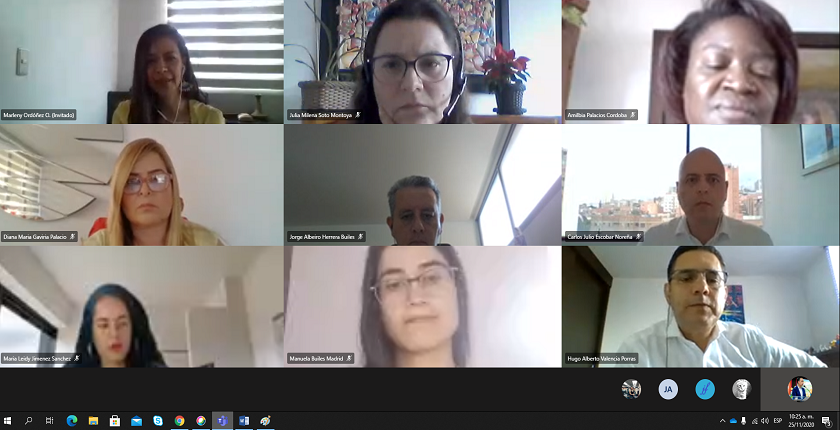Blog
Strengthening of Internal Quality Assurance Systems
- 25 noviembre, 2020

The María Cano University Foundation participated in the call to strengthen the Internal Systems of Quality Assurance – SIAC carried out by the Directorate for the Promotion of Higher Education of the Ministry of National Education, which aims to provide accompaniment and technical support to institutions of higher education in the country in strengthening internal quality assurance systems. The call was opened in July, where 100 higher education institutions in 22 departments and Bogotá were selected, including María Cano.
The work carried out included three phases:
- Technical support: which includes key stages for institutional life such as categorization, previous progress, enlistment, formation of the work committee, articulation, planning and socialization.
- Workshops for reflection and dialogu
- Quality workshops belong to everyone
With the exercise carried out, which was accompanied by experts from the Universidad del Valle, strengths and opportunities for improvement were identified:
Strengths:
The model of self-evaluation and continuous improvement, as a design of the Institution and that articulates the guidelines of the CNA, qualified records and ISO 9001 standard.
The María Cano University Foundation has defined its self-assessment components as key elements for its self-regulation and continuous improvement processes.
- Academic self-evaluation (Teacher evaluation), includes self-evaluation and hetero-evaluation
- Self-evaluation of personnel. (Administrative personal evaluation) «My evolution in the service»
- Follow-up of graduates
- Self-evaluation of institutional management
- Self-assessment for accreditation and / or continuous improvement purposes
- Internal audit
- Institutional system for the evaluation of learning SIE-A
The Institution has an information management system for the academic part and one for the financial and Human Resources part GESTASOFT and ACADEMUSOFT.
The instruments that collect the appreciation of the academic community and the different interest groups are highlighted, designed according to the population and the type of self-assessment and a procedure for its application, processing and data analysis.
The quality certification for the teaching process is a solid and foundational experience to continue with the certification of the other missionary processes, since we have the infrastructure to do so.
The SIE-A that allows you to be at the forefront of Learning Outcomes approaches.
The work team formed to take on the SIAC strengthening process.
Improvement Opportunities:
- The integration of the different information systems.
- Systematize the results of the Institutional System for the evaluation of learning SIE-A
- Update the Self-Assessment and Continuous Improvement System in accordance with the guidelines of Decree 1330 and Agreement 02 of 2020.
- Improve planning tools and monitoring mechanisms.
- Systematization of the processes and procedures articulated to the process map, allowing permanent consultation of the academic community and responding to the requirements of the new regulations and institutional guidelines.
- Review and adjustment of Self-Assessment strategies to respond to internal and external requirements.
Conclusions of the work carried out:
- Self-evaluation is for María Cano an Institutional commitment that establishes a Culture of Quality in the University Community, conducive to achieving the expected academic results and responding to the demands of society, as contemplated in its Culture of Quality document and it is expressed permanently by the people responsible for these processes.
- The Institution has good practices that can be shared with other HEIs, to have other visions that provide feedback or complement.
- There is political will in the institution that guarantees the operation of the SIAC and the generation of favorable impacts for the institution.
- The Institution had significant progress in the implementation of the SIAC, which favored the development of the process under the advice of the MEN.
- The accompaniment by external peers to strengthen the Quality Assurance System, allowed to review the operation and articulation of the processes associated with the exercise of missionary and support functions, which promote or hinder the achievement of high impact indicators, consistent with the CNA and MEN requirements for Higher Education Institutions in the national territory. This process resulted in an action plan consistent with the baseline, the institutional nature, and the goals that are intended to be met in the short, medium, and long term.
- Updating the scope of the quality assurance system will favor the understanding of the process as an essential part for achieving the results proposed for missionary and support functions, therefore, it is the duty of generating strategies that promote their knowledge, understanding and scope.
- Quality implies the continuous effort of the different academic and administrative units of the institution to comply responsibly with the requirements of each of their functions.
- One of the Institution’s challenges is that of the articulation of the different components of the Internal Quality Assurance System, whose main objective should be to deploy in society a process of illustration on the meaning, value and quality levels of higher education. This will not be possible if said system is not capable of showing society models and references of the expected quality, understanding that the mission of future professionals is not only to respond to social demands, but also to transform and contribute to society.
In this way, María Cano advances in an accelerated and committed manner in the search to strengthen the quality and accreditation of its programs, in accordance with the projects established in its Development Plan 2017 – 2026 «Construyendo Futuro».
#MásMaríaCano
